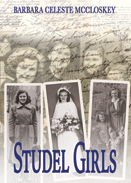
 |
Marta Schmidt, Leisel Fuchs, and Heidi Schneider are three best friends growing up in 1930s Germany. While their families may be working in some capacity for the growing Nazi Party, the girls themselves have different dreams. Marta wants to study art in Paris. Leisel hopes to attend university and become a math professor. Meanwhile, Heidi dreams of being a dancer. But life after high school ends up drastically different for each girl, as they enter adulthood near the start of World War II. Each of them must figure out a way to navigate this new and scary world, brought on by Hitler's rise to power. A gripping story that follows each girl's path, this bittersweet novel of historical fiction focuses on the strength and kindness of people that are necessary to survive a cruel war. McCloskey's prose is short and sweet, succinctly conveying the protagonists' depth of feeling, as well as building a realistic portrayal of Paris, Berlin, Budapest, and other cities that faced the harshness of Nazi Germany.
McCloskey positions the three heroines of her story as coming from Nazi-aligned families. It is an interesting, deliberate choice. Readers would be hard-pressed to find sympathy or empathy for characters with terrible politics. However, Marta, Leisel, and Heidi are not fans of the SS indoctrination that their friends and families seem to accept. The young women recognize the privilege they receive from being in close positions of power, but they are still trapped by the "traditional" German values that are being imposed upon them. Their only hope of escaping being SS wives and fulfilling their dreams is either further education or a trip outside of Germany. Marta and Heidi are successful in leaving Berlin. Marta is granted a summer in Paris to continue her arts education. Heidi heads for Warsaw for a nanny position. But Leisel fails to convince her father, a high-ranking SS official, of the importance of a university education and resigns to go to bride-school and marry a Nazi officer. The future that each girl dreamed of is not exactly what they wanted, and McCloskey's separation of the three friends and the hardships they face illustrates the cruelty and unfairness of war.
Each woman faces a different trouble due to the war: Marta's girlfriend is sent to prison for being part of the Resistance; Leisel suffers from abuse and neglect in her relationship; Heidi travels through Eastern Europe to keep the three Jewish children she nannies safe. They all go through moments of despair, but they turn to their friends and family through letter writing for hope and guidance. Sometimes the letters contain good news. At other times the tidings are tragic, but the correspondence in the novel acts as a reminder of the goodness that can be found in humanity. Additionally, the letters show the importance of a strong support system, which the protagonists rely on throughout their trials. Although there is a mostly happy ending for the women of this book, the story also highlights how war can profoundly change someone's life. It also shows how a person operates going forward. While there are trauma and pain, the author reminds readers that there is also happiness to look forward to after survival.